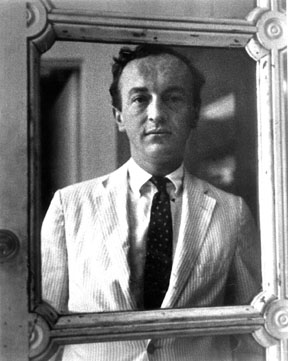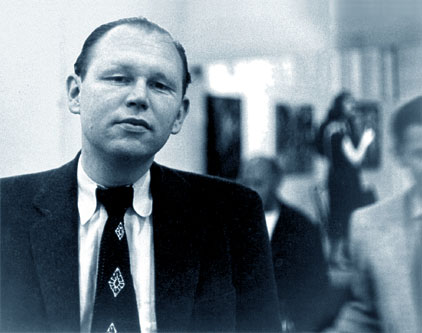 comes into American poetry in a big way in, or at least by, the mid-1950s. By this I mean not just the foreign but the obviously translated, the slightly awkward, the conspicuously non-American and non-English. Exhibit A: Frank O'Hara's Meditations in an Emergency (1957), particularly the poems "The Hunter" and "On Looking at La Grand Jatte, The Czar Wept Anew":
comes into American poetry in a big way in, or at least by, the mid-1950s. By this I mean not just the foreign but the obviously translated, the slightly awkward, the conspicuously non-American and non-English. Exhibit A: Frank O'Hara's Meditations in an Emergency (1957), particularly the poems "The Hunter" and "On Looking at La Grand Jatte, The Czar Wept Anew":"He went to strange hills where
the stones were still warm from feet,
and then on and on. There were clouds
at his knees, his eyelashes
has grown thick from the colds,
as the fur of the bear does
in winter. Perhaps, he thought, I am
asleep, but he did not freeze to death." (CP, 167)
"He cannot, after all, walk up the wall. The skylight
is sealed. For why? for a change in the season,
for a refurbishing of the house. He wonders if,
when the music is over, he should not take down
the drapes, take up the rug, and join his friends
out there near the lake, right here beside the lake!
'O friends of my heart!'" (CP, 63)
The tone in these passages is odd but not too odd, less formally idiosyncratic than idiomatically off. A phrase like "the fur of the bear" could easily be made to sound less ridiculous (probably not O'Hara's purpose in this poem which, like so many others, verges on camp mockery) but the juxtaposition of images (frozen eyelashes and bear's fur) wouldn't be as striking if it were smoothed out that way. Even more noticeably, "For why?" is not exactly English: it's the sort of endearing mistake non-native speakers make all the time, but which in a poem achieves an uncanny effect unavailable to "Why?" or "What for?" The sense I get is that O'Hara is tentatively approaching, through parody, a style that in the 70s and 80s actually becomes a mainstream mode of American poetry, with Deep Image, Charles Simic et al: a style whose hallmark is the combination of a semi-colloquial simplicity coupled with a more formal-seeming resistance to contractions ("I am" not "I'm," "should not" not "shouldn't").
 This is happening in other avant-garde work of the time, too. Exhibit B: Jack Spicer's After Lorca (1956), which purports to be an actual volume of translations though, as the ghost of Lorca writes in his introduction, "Mr. Spicer seems to derive pleasure in inserting and substituting one or two words which completely change the mood and often the meaning of the poem as I had written it" and "there are an almost equal number of poems that I did not write at all (one supposes that they must be his) executed in a somewhat fanciful imitation of my earlier style" (11). The poems themselves are good but, to me, unremarkable; however,
This is happening in other avant-garde work of the time, too. Exhibit B: Jack Spicer's After Lorca (1956), which purports to be an actual volume of translations though, as the ghost of Lorca writes in his introduction, "Mr. Spicer seems to derive pleasure in inserting and substituting one or two words which completely change the mood and often the meaning of the poem as I had written it" and "there are an almost equal number of poems that I did not write at all (one supposes that they must be his) executed in a somewhat fanciful imitation of my earlier style" (11). The poems themselves are good but, to me, unremarkable; however,they are interspersed with fascinating micro-manifestoes, in the manner of Williams' Spring and All, which explicitly throw over Modernist precepts by declaring that the specific words of the poem, and whatever intricate changes are wrought on them, do not matter, since all such tinkering is doomed to be lost in translation anyway. Here's one of the more provocative moments:
Most of my friends like words too well. They set them under the blinding light of the poem and try to extract every possible connotation from each of them, every temporary pun, every direct or indirect connection — as if a word could become an object by mere addition of consequences. Others pick up words from the streets, from their bars, from their offices and display them proudly in their poems as if they were shouting, "See what I have collected from the American language. Look at my butterflies, my stamps, my old shoes!" What does one do with all this crap?
Words are what sticks to the real. We use them to push the real, to drag the real into the poem. They are what we hold on with, nothing else. They are as valuable in themselves as rope with nothing to be tied to. (Collected Books of Jack Spicer, 25)
Note that Spicer's reasons for writing in this style is not metaphysical but rhetorical: it's not that he values "the real" in and of itself, but that he wants his poems to last, and to travel. Haunting the first of these paragraphs is a judgment that two of the most influential strains of Anglo-American Modernism in the first half of the 20th century — the "blinding light" school of Eliot and Empson and the "stamp collection" school of Moore and Pound — are not aging, or translating, well. (This might also be the place to note that Spicer, like O'Hara, comes to this partial rejection of Modernist aesthetics through the oblique channels of camp. After Lorca is a very funny book.)
Final question: is this kind of thing really new? Though imitation of non-English sources had been going on for a long time (at least since Whitman, and probably earlier), most of those give the impression that the writer read those sources in the original: they imitate them as they were familiar with the work on its own terms, trying to replicate some quality in the language. Or, more rarely, they just ignore the poem's original linguistic presentation and engage them solely on the level of theme. But part of what interests Spicer and O'Hara, in different ways and for different reasons of course, is the style of translation itself, and the then-novel fact that they're even able to read poetry so geographically and linguistically remote from them as if it were written in English. (To my mind, this also distinguishes what they're doing from Pound's material reminders to the reader of his work's translatedness — "lie quiet Divus" and the like — which still imply a first-order encounter with the original text, won through the poet's own attention and labor.)
That's all I got for now. But the magazine New World Writing, which appeared from 1952 to 1959 and which O'Hara mentions in a later poem (he buys it in order "to see what the poets in Ghana are doing these days"), might be an interesting place to look in pursuing this question.
